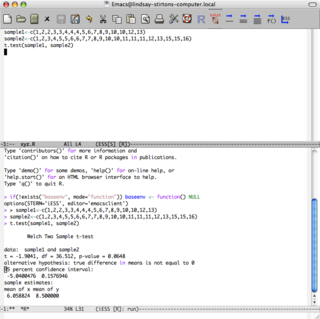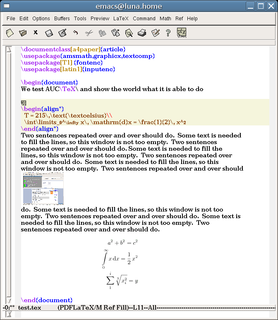The editor war is the rivalry between users of the Emacs and vi text editors. The rivalry has become a lasting part of hacker culture and the free software community.

Emacs Lisp is a dialect of the Lisp programming language used as a scripting language by Emacs. It is used for implementing most of the editing functionality built into Emacs, the remainder being written in C, as is the Lisp interpreter. Emacs Lisp is also termed Elisp, although there is also an older, unrelated Lisp dialect with that name.

XEmacs is a graphical- and console-based text editor which runs on almost any Unix-like operating system as well as Microsoft Windows. XEmacs is a fork, based on a version of GNU Emacs from the late 1980s. Any user can download, use, and modify XEmacs as free software available under the GNU General Public License version 2 or any later version.

GNU TeXmacs is a scientific word processor and typesetting component of the GNU Project. It was inspired by TeX and GNU Emacs, though it shares no code with those programs. TeXmacs does use TeX fonts. It is written and maintained by Joris van der Hoeven. The program produces structured documents with a WYSIWYG user interface. New document styles can be created by the user. The editor provides high-quality typesetting algorithms and TeX fonts for publishing professional looking documents.

Gnus, or Gnus Network User Services, is a message reader which is part of GNU Emacs. It supports reading and composing both e-mail and news and can also act as an RSS reader, web processor, and directory browser for both local and remote filesystems.

Emacs Speaks Statistics (ESS) is an Emacs package for programming in statistical languages. It adds two types of modes to emacs:
- ESS modes for editing statistical languages like R, SAS and Julia; and
- inferior ESS (iESS) modes for interacting with statistical processes like R and SAS.

AUCTeX is an extensible package for writing and formatting TeX files in Emacs and XEmacs.

JabRef is a reference management software that uses BibTeX and BibLaTeX as its native formats and is therefore typically used for LaTeX. The original version of JabRef was released on November 29, 2003.
its name JabRef stands for Java, Alver, Batada, Reference.
JabRef provides an interface for editing BibTeX files, for importing data from online scientific databases, and for managing and searching BibTeX files. JabRef is released under the terms of
MIT license since version 3.6. The application is programmed in Java, and is maintained for Windows, Linux and Mac OS X, it is available free of charge and is actively developed.

JED is a text editor that makes extensive use of the S-Lang library. It is highly cross-platform compatible; JED runs on Windows and all flavors on Linux and Unix. Older versions are available for DOS. It is also very lightweight, which makes it an ideal editor for older systems, embedded systems, etc. JED's Emacs mode is one of the most faithful emulations available.

Aquamacs is an Emacs text editor for macOS. It is based on GNU Emacs, currently tracking the GNU Emacs version 25.3 branch. Although GNU Emacs has had native UI support on macOS using the Cocoa API since version 23, Aquamacs modifies the user interface to conform with macOS standards in preference to Emacs standards.

RefDB is a client/server reference database and bibliography tool for markup languages like SGML, XML, and LaTeX. It is suitable for standalone use for the purpose of self-archiving, but can be used as an institutional repository as well. Data storage proper is done in one of several supported SQL database engines. RefDB runs on Unix-like operating systems and on Windows/Cygwin. RefDB is licensed under the GPL.

GNU Emacs is the most popular and most ported Emacs text editor. It was created by GNU Project founder Richard Stallman. In common with other varieties of Emacs, GNU Emacs is extensible using a Turing complete programming language. GNU Emacs has been called "the most powerful text editor available today". With proper support from the underlying system, GNU Emacs is able to display files in multiple character sets, and has been able to simultaneously display most human languages since at least 1999. Throughout its history, GNU Emacs has been a central component of the GNU project, and a flagship of the free software movement. GNU Emacs is sometimes abbreviated as GNUMACS, especially to differentiate it from other EMACS variants. The tag line for GNU Emacs is "the extensible self-documenting text editor".
The registered trademark symbol (®) is a symbol that provides notice that the preceding word or symbol is a trademark or service mark that has been registered with a national trademark office. A trademark is a symbol, word, or words legally registered or established by use as representing a company or product. In some countries it is against the law to use the registered trademark symbol for a mark that is not officially registered in any country.

Org-mode is a document editing, formatting, and organizing mode, designed for notes, planning, and authoring within the free software text editor Emacs. The name is used to encompass plain text files that include simple marks to indicate levels of a hierarchy, and an editor with functions that can read the markup and manipulate hierarchy elements.
xdvi is an open-source computer program written by Paul Vojta for displaying TeX-produced .dvi files under the X Window System on Unix, including Linux.

Emacs Web Wowser is a web browser written entirely in Emacs Lisp. It became part of GNU Emacs starting with version 24.4. If Emacs is compiled with the suitable image libraries, and is used in a graphical environment, it can render images inline directly into Emacs's display buffer. It requires an Emacs built with libxml2 support. Written by Lars Magne Ingebrigtsen, it was originally developed as part of the Emacs mail reader Gnus, to display HTML-formatted email, but with the addition of HTTP support from Emacs' url.el package it became a fully-fledged browser.

Spacemacs is computer software, a configuration framework for GNU Emacs. It can take advantage of all of GNU Emacs' features, including both graphical and command-line user interfaces, and being executable under X Window System and within a Unix shell terminal. It is free and open-source software (FOSS) released under the GNU General Public License version 3.












